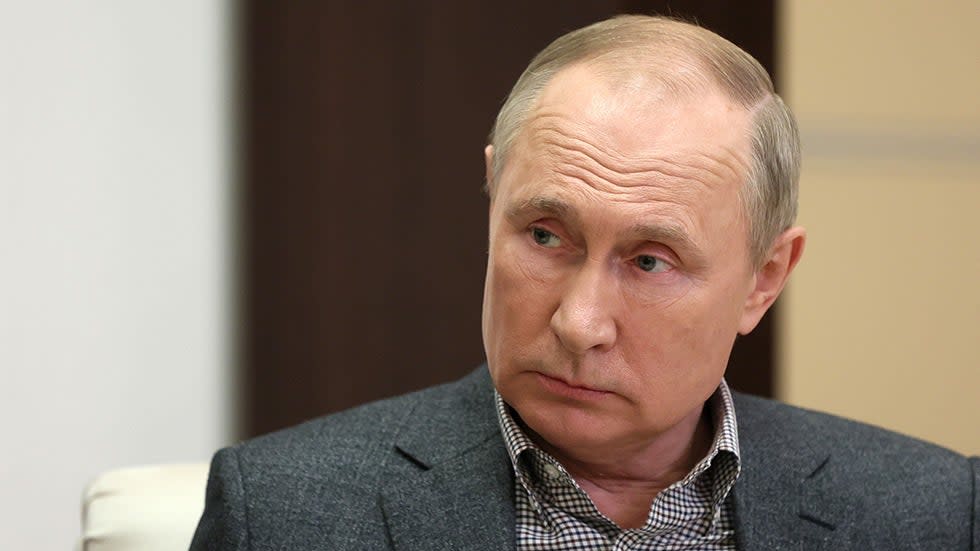Russia's ultimatum: Will Ukraine negotiate peace or risk conflict?

- Oops!Something went wrong.Please try again later.
As the European Union (EU) braces itself for a cold winter with rising energy prices, a fourth COVID wave and the threat of a new migrant crisis orchestrated by Belarus President Alexander Lukashenko, the Kremlin may have found the perfect opportunity to exploit the EU's weakened position in order to forcefully resolve Russia's conflict with Ukraine.
After nearly eight years, the Donbass war between the Ukrainian government and Russian-backed separatists in Luhansk and Donetsk oblasts has resulted in more than 14,000 deaths and nearly 2 million internally displaced persons. The Minsk Accords brokered in 2014 and 2015 by the Normandy Four - France, Germany, Russia and Ukraine - were somewhat successful in preventing further escalation. Their basic premise was to demilitarize the zone, provide amnesty for all actors involved and reintegrate the Donbass while providing the region with greater autonomy. However, failed implementation has resulted in a frozen conflict.
Frustrated with the status quo, Moscow is determined to settle its unfinished business, either through negotiations or annexation. For the second time this year, Russia has amassed nearly 100,000 troops near the Ukrainian border as a demonstration of its military might.
While a full-scale invasion reaching Kyiv seems highly unlikely, Russia could advance its troops in the Donbass and annex part of the region. A successful annexation of part of Donetsk and Luhansk oblasts will embolden the Kremlin to further undermine Ukraine's sovereignty and increase their presence in Odessa and the Black Sea. The international community, of course, will vehemently condemn Russia's actions and most likely add sanctions, but it's doubtful that such action would have any bearing on the Kremlin's decisions. Sanctions put in place after the illegal annexation of Crimea in 2014 have not deterred Russia from intervening in Ukraine.
Furthermore, Russian President Vladimir Putin is instrumentalizing Europe's energy crisis and Lukashenko's erratic behavior as leverage against the European Union. Following the violent suppression of pro-democracy protests and the Ryanair hijacking, Belarus now finds itself sanctioned and largely isolated, and Russia is its main ally. Lukashenko believes that he could blackmail the EU into lifting sanctions through a border crisis with Poland and threats of cutting Russian gas deliveries. In reality, the Belarus president is Putin's puppet.
Should relations between Russia and the West deteriorate, Moscow likely will retaliate against the EU by allowing Belarus to exacerbate the migrant and energy crises while maintaining plausible deniability. Both are contentious issues that risk dividing and weakening the EU.
Even though annexation of Donbass would be to Russia's political and economic detriment, it seems as though the Kremlin is willing to bear the cost if it means resolving the conflict. The reason Moscow hasn't taken military action is that it would prefer intimidating Kyiv into pursuing political negotiations.
Reaching and implementing an agreement regarding the Donbass is the only viable way to protect Ukraine's territorial integrity. However, a sizable political faction in Ukraine opposes reintegration, calling the region a "gangrene" or a "cancerous tumor." It is understandable why the Ukrainian government is apprehensive of reintegrating a region that is predominantly pro-Russian. Since the fall of former Ukraine President Victor Yanukovych in 2014, Kyiv has deepened ties with the West - with aspirations to join NATO and the EU - and has taken on an increasingly hostile position regarding Russian influence. Reintegrating the Donbass back into Ukraine's unitary state would be costly and it could allow Russia to exert considerable influence in the Verkhovna Rada (parliament) of Ukraine and jeopardize Kyiv's geopolitical realignment.
On the other hand, if the Donbass were to become an autonomous republic of Ukraine, the region's influence in the Rada would diminish. While Moscow would retain its presence in the East, it would have limited influence in Western Ukraine. If such an agreement were implemented, the Kremlin would portray it as a victory - but ironically, this compromise would be in both countries' best interests given the current circumstances.
Unfortunately, Ukrainian support for renewed political negotiations remains low and the terms of the Minsk Accords are highly unpopular. Any political leader who would implement a similar agreement might secure peace in the Donbass, and avert a military escalation with Russia, but would effectively be committing political suicide.
Ultimately, the Ukrainian government must decide what to do with the Donbass before the Kremlin acts unilaterally.
Kelly Alkhouli is a political consultant and the director of international relations at the Center of Political and Foreign Affairs. Follow her on Twitter @KellyAlkhouli.

